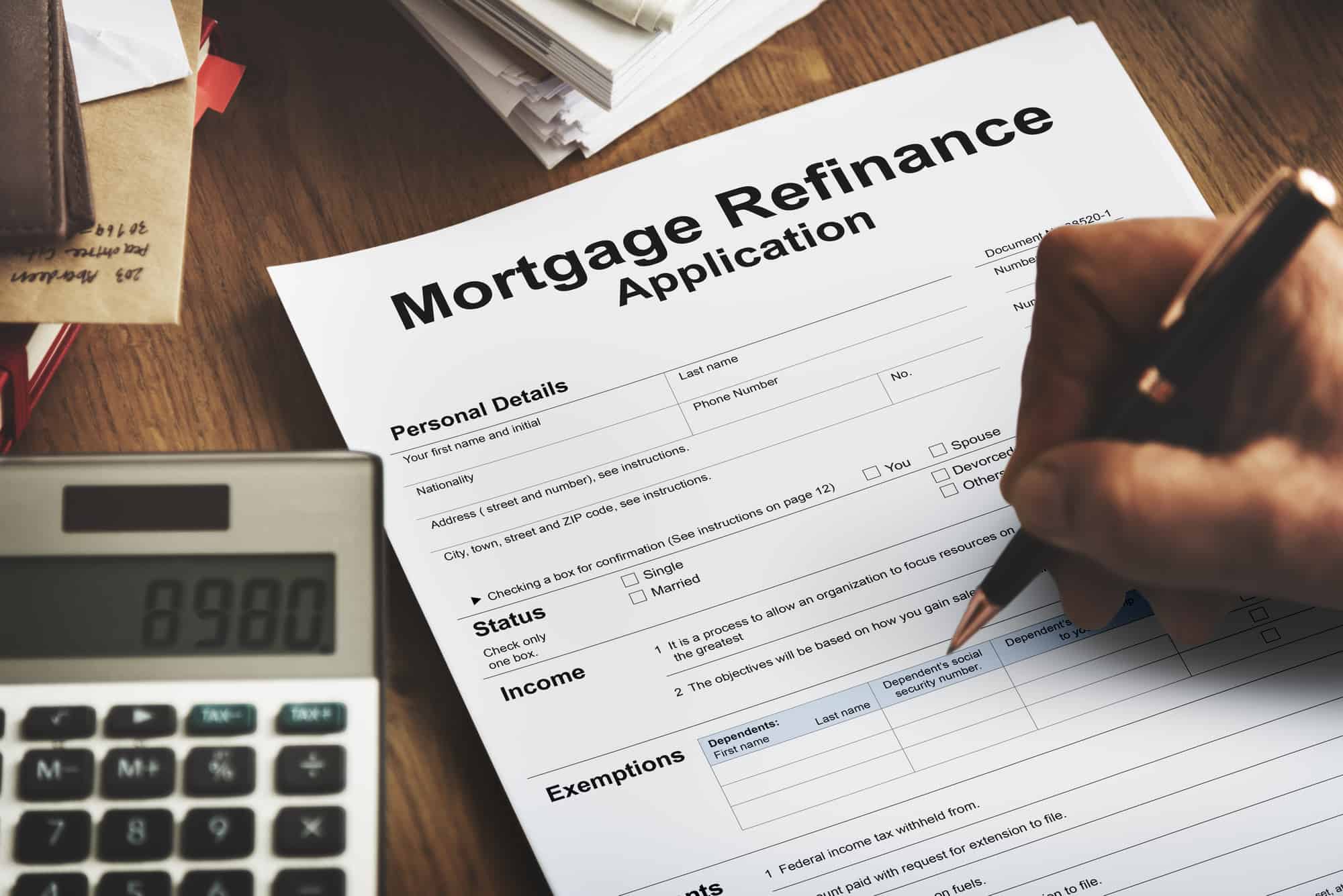To make Wealthtender free for readers, we earn money from advertisers, including financial professionals and firms that pay to be featured. This creates a conflict of interest when we favor their promotion over others. Read our editorial policy and terms of service to learn more. Wealthtender is not a client of these financial services providers.
➡️ Find a Local Advisor | 🎯 Find a Specialist Advisor

When I bought my first house in 2000, mortgage interest rates were over 7%. Sound familiar?
Then, as rates decreased, I refinanced several times, each time at a lower rate and lower payment.
Sometimes I even pulled out some money while decreasing the monthly payment. With my home’s value doubling over the five years I owned the place, the loan-to-value (LTV) let me do that.
If you recently bought a home with mortgage rates higher than they’ve been in years, I foresee one or more refis in your future…
The Shrewd Way to Refi
When refinancing, you need to balance several factors.
- How long you anticipate staying in the home (the long-term average has gradually increased, and according to the New York Times, was recently over 13 years)
- How high your refi closing costs will be, and how much lower your new loan’s monthly payment will be relative to your current payment
- Based on the above, how many months it’ll take to break even on your refi closing costs
- How much, if any, cash-out do you need, and if so, how that affects your qualification, interest rate, monthly payment, and time to break even
Ideally, you want to save at least $100/month, break even in fewer than five years, and not spend more over the life of the loan (or better yet, over the remaining time you’ll likely stay in the home).

The Pros and Cons of Conventional vs. FHA Refinancing
First, you can refi to an FHA or conventional loan whether your current loan is FHA or conventional if you meet all the relevant requirements.
So, which should you go for?
Advantages of a Conventional Refi
First and foremost, interest rates may be lower, depending on market conditions and your credit score.
Second, assuming your LTV is no more than 80%, you should be able to avoid Private Mortgage Insurance (PMI). This is an insurance you buy that protects the lender. If you default, the insurance pays the lender, but will then likely come after you for the money.
Finally, conventional loans usually offer greater flexibility in terms of loan options, repayment terms, and the range of lenders you can work with.
Conventional Refi Drawbacks and How to Avoid or Minimize Them
First and foremost, conventional loans require a credit score of at least 620. If you need or prefer a conventional refi and your score isn’t high enough, try to improve it. There aren’t many ways to do this quickly, but there are a couple:
- Check and correct any errors on your credit reports from the three major bureaus
- Consult with your lender to see which balances owed are best reduced and by how much
The second drawback is that conventional loans typically require lower LTVs. If your LTV is over 80%, you’ll need to pay PMI, and the cost will be higher if your credit score is lower.
Third, conventional loans have stricter Debt-to-Income (DTI) ratio limits. Again, paying down (or off) existing balances can help with this. However, credit cards only add the minimum payments to the debt part of DTI, which is usually around 2% of the balance.
Finally, conventional loans may have stricter guidelines than other loan programs. For example, certain property types or uses may not be eligible for conventional refinancing.
Advantages of FHA Refis
FHA refis have several crucial advantages.
First, you can refi even if your LTV is far higher than what a conventional loan would allow, even if your equity is negative (so-called “short refi” where your LTV is over 100%)!
Second, they’re generally available even if your credit score is far lower than a conventional loan would require. If your score is 580 or higher, you can qualify with any LTV. However, you aren’t out of luck even with a score lower than 580 if your LTV is up to 90%.
Third, you can get cash out of the loan if your credit score is at least 580, your LTV (after taking the cash out) is no more than 80%, and the property has been your primary residence for at least the past 12 months.
Fourth, you can get a refi to repair or rehab your property.
Finally, FHA loans offer a streamlined refi program (see below) that simplifies the process by reducing documentation and paperwork requirements, making the refi process faster and more convenient. However, this program only lets you refinance an existing FHA loan.
Drawbacks of FHA Refis
The first drawback is an annoying extra cost similar to PMI, called Mortgage Insurance Premium (MIP). FHA loans require both upfront and annual MIP, regardless of your LTV (which means you can’t get rid of it at 80% LTV like PMI). This adds to your overall borrowing costs over the life of the loan. The only way to avoid this drawback is to refi again to a conventional loan as soon as your credit score, LTV, and DTI allow.
Second, FHA loans are limited by the government, so if your existing loan is too large, an FHA refi would only refinance a portion of your current balance. This may mean the FHA route isn’t viable for you.
Third, FHA interest rates are usually a bit higher than you’d get from a conventional refi, increasing your cost over the life of the loan. This too is only avoidable by refinancing again to a conventional loan as soon as possible.
Fourth, in certain situations you cannot get an FHA refi if your DTI is too high and/or if you cannot document making all your monthly payments for the past year.
Fifth, if you want cash out of the refi, you’ll need a credit score of at least 580 and an LTV of no more than 80%. This is not very high, but it is a strict requirement.
Finally, FHA refis may not be available for certain types and uses of properties. For example, they may not be possible for investment properties and/or certain condo types.
The FHA Streamline Refi (of Existing FHA Loans)
In certain circumstances, you can use the FHA streamline refi for an existing FHA loan. For example:
- You can lower your monthly payments by extending your loan by up to 12 years, as long as you’re also able to reduce the rate
- You can refi out of an Adjustable Rate Mortgage (ARM) to a fixed-rate loan
- You can use this program even if your property is (financially) “underwater” – i.e., you owe more than it’s worth (LTV over 100%); interestingly, this means the refi likely won’t need an appraisal since the value of the home isn’t relevant, just your current mortgage payoff balance.
If your refi takes a co-borrower off the loan, you’ll need to qualify based on your credit score and DTI ratio.
In other cases, the lender may not need to verify your income and will be able to ignore some aspects of your credit report, making approval both faster and easier (i.e., “streamlined”).
There are also some timing and payment requirements for this program.
Specifically, you need to have made at least six payments on your current FHA loan, none of which was over 30 days overdue. In the past year, no more than one of your payments was late by more than 30 days. At least six months must have passed since your first payment was due and your current loan must have closed at least 210 days earlier.
You can even do a streamline refi more than once for the same property, as long as you meet all the requirements.
Note that streamline refis don’t let you fold your closing costs into the new loan, so you’ll need to bring at least some money to the closing, unless the lender covers those costs for you in return for a slightly higher interest rate.
Note also that streamline FHAs don’t let you take more than $500 cash out.
The Bottom Line
A mortgage refi doesn’t always make sense, especially if market rates are higher now than the interest rate of your existing loan.
If you do want or need to refinance, an FHA refi can be the better choice if:
- Your credit score is too low for conventional loans (under 640 in some cases, but especially under 620)
- Your LTV is over 80%
- You want to avoid reappraising the home and/or proving your income (possible if your current loan is FHA)
A conventional refi is likely your better bet if:
- Your credit score is at least 620 (the higher the better)
- You can prove your DTI is low enough
- Your LTV (with or without cash out) is no more than 80%
Given the complexity of many of these programs and the financial risks if you make the wrong move, you’d do well to consult with a knowledgeable professional before jumping in.
Disclaimer: This article is intended for informational purposes only, and should not be considered financial advice. You should consult a financial professional before making any major financial decisions.
About the Author
Opher Ganel
My career has had many unpredictable twists and turns. A MSc in theoretical physics, PhD in experimental high-energy physics, postdoc in particle detector R&D, research position in experimental cosmic-ray physics (including a couple of visits to Antarctica), a brief stint at a small engineering services company supporting NASA, followed by starting my own small consulting practice supporting NASA projects and programs. Along the way, I started other micro businesses and helped my wife start and grow her own Marriage and Family Therapy practice. Now, I use all these experiences to also offer financial strategy services to help independent professionals achieve their personal and business finance goals.
Connect with me on my own site: OpherGanel.com and/or follow my Medium publication: medium.com/financial-strategy/.
Find a Financial Advisor
Do you have questions about your financial future? Find a financial advisor who can help you enjoy life with less money stress by visiting Wealthtender’s free advisor directory.
Whether you’re looking for a specialist advisor or prefer to find a financial advisor near you, you deserve to work with a professional who understands your unique circumstances.
Have a question to ask a financial advisor? Submit your question and it may be answered by a Wealthtender community financial advisor in an upcoming article.
This article originally appeared on Wealthtender. To make Wealthtender free for our readers, we earn money from advertisers, including financial professionals and firms that pay to be featured. This creates a natural conflict of interest when we favor their promotion over others. Wealthtender is not a client of these financial services providers.
Do you already work with a financial advisor? You could earn a $50 Amazon Gift Card in less than 5 minutes. Learn more and view terms.
Disclaimer: This article is intended for informational purposes only and should not be considered financial advice. You should consult a financial professional before making any major financial decisions.
What to Read Next:
To make Wealthtender free for readers, we earn money from advertisers, including financial professionals and firms that pay to be featured. This creates a conflict of interest when we favor their promotion over others. Read our editorial policy and terms of service to learn more. Wealthtender is not a client of these financial services providers.
➡️ Find a Local Advisor | 🎯 Find a Specialist Advisor

